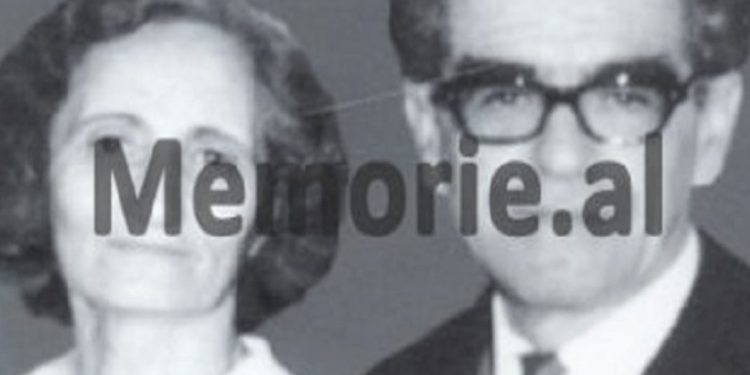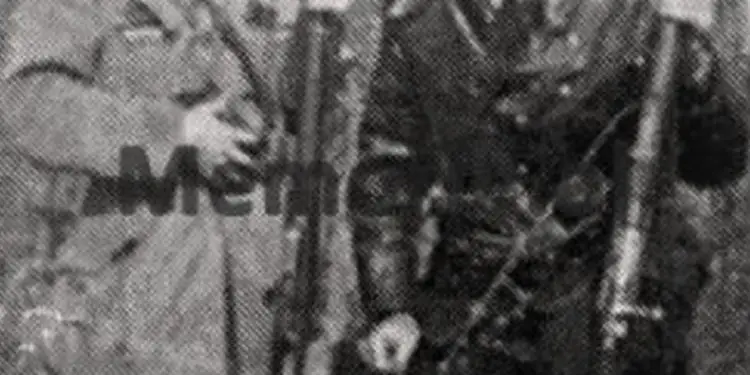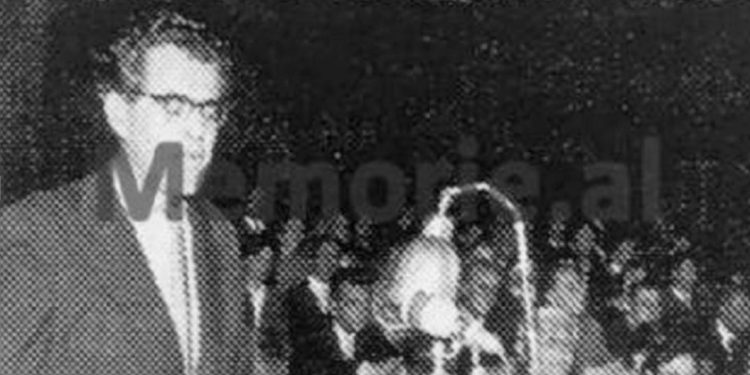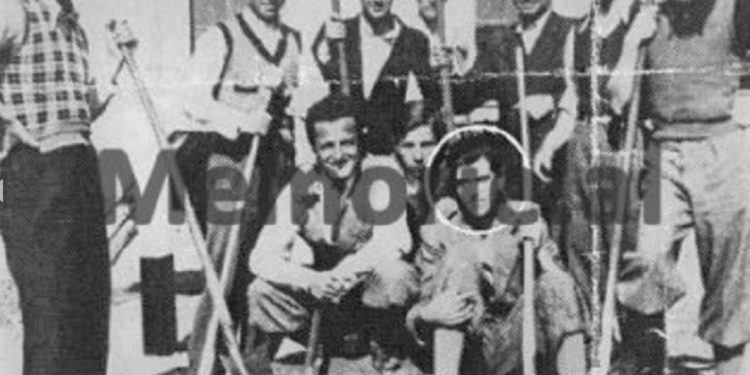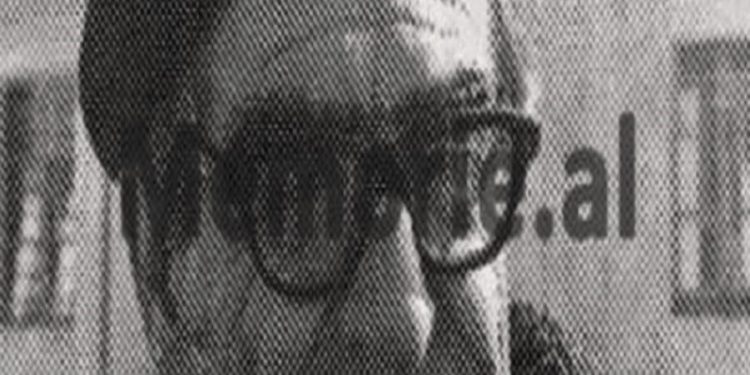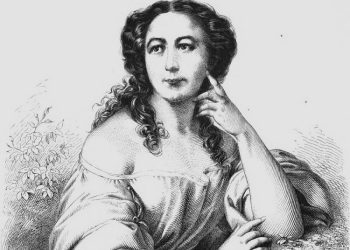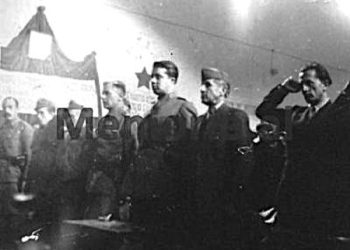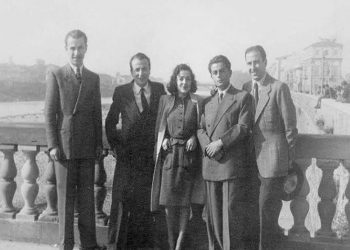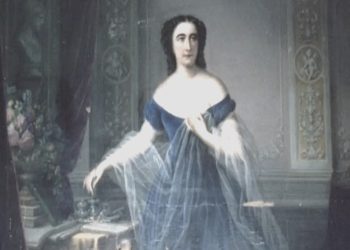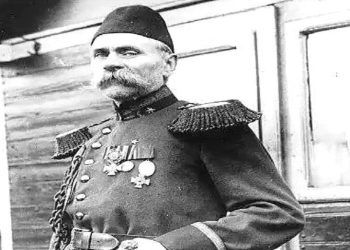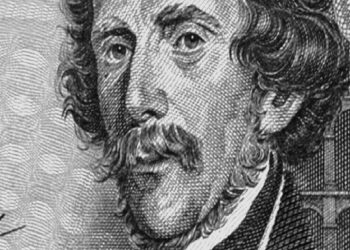By Selfixe Broja (Ciu)
Second part
Memorie.al / Selfixhe Ciu (Broja) was born in 1918 in the city of Gjirokastra, in a wealthy citizen family, as her father, Ibrahim Ciu, was a large merchant. After finishing the unique school, she continued her studies for two years at the Gjirokastra High School, but after its closure, she completed them at the Tirana high school. She had a passion for literature and at that time she published the first poems and stories in the press of the time, which she signed with the literary pseudonym “Colombia”. In 1935, (when he was 17 years old), after publishing his first poem in the magazine “Populli”, “Bota e Re”, “Java”, “Diana”, “Drita”, “Stypi”, etc. In the high school of Tirana, she embraced communist ideas, through her close friend Zef Mala, Chairman of the Communist Group of Shkodra, and in the late 30s, Selfixeja, had a friendship with Qemal Stafa and Vasil Shanto, (with whom she introduced Zef Mala) and was accepted as a member of the Communist Group of Shkodra, although she was a student in Tirana. In 1938, Selfixheja went to Italy, to the University of Florence, to the Faculty of Literature, where at that time Qemal Stafa, Nikolla Shurbani, Ramadan Sokoli, Andrea Varfi, Musine Kokalari and her cousin, Qibrie Ciu. After returning to Albania, she reconnected with the communist groups and after the formation of the NPSH, she was sent to Shkodër to work with the Anti-Fascist Women’s Organization, was arrested by the Italians and kept in Tirana prison for 11 months. After the end of the war, her husband Xhemal Broja was appointed to the Arts Committee in Tirana, and Selfixheja as a journalist in the Ministry of Agriculture, where the newspaper “Bujku u Ri” was published. On March 23, 1946, Xhemal and Selfijën were expelled from the Party (as anti-Yugoslavs) calling them “enemies of the people and agents of the American mission” and on January 17, 1947, they were interned in Gusmar of Kurveles, working in agriculture. After the break with the Yugoslavs in ’49, they returned them to Tirana, where Selfixheja, after working for a short time in the Ministry of Education, resigned. In 1966, Xhemal and Selfixhe were exiled again for six years in Gradishte, Lushnje, accusing them of “a decadent spirit in Art and Literature”. After that, the screening of the film “Detyre e Posaçme”, where Xhemali had one of the main roles, was also banned. They returned to Tirana in 1971, where Selfixheja was locked up at home, while Xhemali, after working for some time at the Kinostudio “Shqipëria e Re” as an administrator, was sent as a worker to the Agricultural Farm “Gjergj Dimitrov”. They were also deprived of the right to publish, since they were both expelled from the Writers’ Association in ’66. Being monitored by the Security, they were locked in the house, where Xhemali studied, writing memoirs and plays. Xhemali passed away in 1976, and Selfixeja in 2003, at the age of 85. They left two daughters: Sashenka and Mary. In 1998, Selfixheja wrote her memoirs, publishing them in the book “Tallazet e jetës”, from which Memorie.al has selected and published some of them, in this two-part article.
-The confession of an internee, about the night of her arrest-
Continues from last issue
We received the relevant instructions from the operator of the area:
- To appear in appeal three times a day.
- We are criminally responsible if we exceed the specified limits.
- To go to Lushnje, for any need, we had to obtain permission from the District’s Internal Branch. While for any reason, whether to go outside the district, the permit had to be granted by the Ministry of Internal Affairs.
Under the general curiosity of the residents, exiled or free, who were given the opportunity to break the monotony, with their help we were carried to the respective apartments. When we finished it was completely dark and the lights didn’t work. We didn’t have any lamps, candles or even matches with us. We didn’t know what to expect. But after a moment two young men knocked on the door offering their help to fix the electric line. In the circumstances we were in, that help had a double value for us. In the exchange of the first informative questions, we learned that one was serving the second five-year deportation measure, the other the deportation. It was the first time we were informed about the existence of these scaled measures.
- Why are you accused? – We asked. After exchanging a bitter chuckle, one replied:
- Me, “for the fault” of my grandfather, this for the “fault” of my uncle.
In fact, one paid tribute as the nephew of Mehdi Frashër, former prime minister, fugitive, the other, as the nephew of Teme Sejko, former Rear-Admiral of the Naval War Fleet in the period after liberation, recently executed. They were there as a family, anxiously awaiting the fulfillment of the measure’s deadline, which, in the best case, would be scaled to a lighter measure. Otherwise, what was more likely, the repetition of the five-year-old, which was also the warning of the five-year-old’s that would come after?
– Do such cases exist? – We asked impressed.
-“Only here in the sector there are dozens of families or individuals, and the same happens in the whole district of Lushnje and Fieri”.
-Isn’t there hope for release?
– “Liberation for us exists simply as an abstract notion and such a possibility will remain until we close our eyes”, – he added with unrestrained laughter.
This information, completely ignored by us, caused us deep shock. How is it possible that an administrative measure, based on the “class war”, such as the guilt of family members, who in many cases did not even know the accused, or based on slander, conjecture or class origin, took on an unlimited punitive character and not rarely eternal?! Did this action comply with the legality of the “constitution”, declared by the most “Democratic”?
It was the first blow we suffered, not yet entering the practice we were going to go through. Gripped by an involuntary silence, we parted with those young companions of suffering and disappointments, among the best companions who remained in our memory: A. Plaku and Tefik Çela.
We were left alone. Only with shock and revolt that knew no bounds. We felt that something had been torn from our souls that could not be fixed again. This feeling made us speechless. Communication through silence. Pain for yourself, but for those two young people who are so loving and sincere, for their friends and family, for our parents and children, for the people of long-suffering Albania!
In the meantime, we had to get organized somehow. With broken hands and frozen souls, we set off. As we finished close to midnight, we tried to eat something. But even though we haven’t eaten for 24 hours, we can’t swallow a single morsel. Even to sleep, we did not find it easier. Excitement of the nervous system had created a state of anxiety, a state of spiritual alarm.
Gloomy thoughts, raging like waves to the storm, clashed against the resistance of consciousness, as in a life-and-death match. And we absolutely had to win this game. However dark the reality presented itself, life had to be lived. We had to live for our dignity, for the sake of the children and the bereaved mother, but, a little more, to challenge the perpetrators.
We would not allow ourselves to surrender. Thus, after the night that surrounded us, under the first rays of dawn, we felt that the spark of life was kindling in our souls. We leaned against the window and deeply thirsty, we inhaled with all our lungs that breathe of life that nature was giving us generously. We felt as if, through that breath, penetrated the scent of girls, the sorrow of a mother, the warm warmth of the hearth, and we praised you with our whole being.
A day dawned like any other, and on that day, we would take our first steps into the unknown. And here… the morning greeting with the “appeal”!
Lined up one after the other, those human shadows, reflecting the dusk as early as the first rays of dawn, were waiting to be called upon. The appeal, the counting like the cattle in the stable, to prove the presence, with two simple syllables: “Here, here, here, here…”! Macabre echoes spread as a denial of human dignity. “Here…”, our voice also sounded mechanically, and that mixed breath of living death melted into the miserable every day.
With the seal of spiritual wounds on the forehead, of toil and exhaustion, with a mournful appearance, that amorphous mask of men and women, young and old, crippled physically and morally, without today, saw a hope for a future better, with work tools, diligence and food enough to hold his breath, he was crawling towards the daily struggle with life. We were also included in that fateful queue. We were assigned to begin work on the process of dehusking the corn, which at that time presented less difficulty.
Everyone’s eyes darted in our direction, as a newcomer. For several years, the word had circulated that: “those hit for serious crimes”, we would be brought from Tirana, as exiles, the elements that represented weighty functions. This somewhat singular event in that exhausting tumult had stirred the numbed imagination of the inhabitants. Assumptions about errors or faults, as well as about the functions they represented, developed to hyperbolic proportions. Here, facing a normal aspect, somewhat disappointed, in the intersection of their gazes, the question stood out: “These were”?!
However, there was no reason for them to withdraw from the flow of amusing curiosity. And the questions, from one mouth to the other, were clearly developing: “Who are they”, “what is the connection between them”, “what mistakes could they have made”, “who will have been the director, inspector, maybe also the deputy minister …”?! Everyone defined the hierarchical levels according to their own impressions. There were also some who felt that the accumulated hatred against the ruling caste, the cause of their endless suffering, was within their right, to vent it on these newly arrived tyrants, as if we could be smaller fish.
After all, as high officials, we were obviously tools of that caste. “Would it be good for them, then? Let the gentlemen try once how much sweat is poured out to secure a morsel, because they have had enough mold in armchairs and in cars”. Another was waiting: “Do you think they will get down to work, or will they work as hard as they can, because they have reserves, they have milked the desert people well. They will work no matter what you have with it, how they will work. Why didn’t they bring them to bring tebdil-hava here”? “As for reserves – said another, – as long as they have brought convicts, all of them will be taken by the state. Let them, apparently, be sentenced to forced labor, and let them do whatever they want. You can see how they hang around, like wet chickens. Even the one over there, who pretends he doesn’t know, has them. Whore doesn’t drink water here. Lying down, they will remove the dance” – and gave him a sarcastic laugh.
Irresponsible for what he said, he turned to someone who removed the remark: “That’s all it does to me if they listen to me. Nor are these also the support of those who forced us to curse the birth…?! So let them pay that part of the debt that belongs to them. For the big ones, these are now nothing but squeezed lemons”! And this slaked milk boiled in the thought of the soul of many others, a spirit that was reflected in their looks that pierced like a needle another side, on the contrary, radiated the spirit of human solidarity, which in special circumstances takes on a deeper character. That expression of silent affection, which said more than words, stopped our hopes for understanding and fraternal support. But besides to these two currents, the furious wind of official opinion blew, which was represented by the head of the sector, the chairman of the Council, the secretary of the Party organization, consisting of four or five people, as well as some free residents, tools at their service.
What was the composition of this group that represented the official authority? In general, elements without any cultural horizon or profile, carrying the typical mentality of the peasant related to property, despite the fact that this already belonged to the structure of the socialist system. We were willing to violate not only moral-civic laws, but also state laws, if they found a path; it is enough to reach the goal for personal benefits of any nature. Based on these mean characteristics, selected head to head, by the relevant instances in their mission of supervising the contingent of the punished, in order to gain points, sometimes exceeded their powers of disciplinary measures. Woe to whoever was targeted. In addition to these, there were also some former internees, or deportees, who, for some relief of the sentence, turned into genuine provocateurs or spies. For this as well as for the whole environment, we were immediately informed by our benefactors, with whom we had an understanding from the first day.
The next day by telegram, we let the family know where we were. After two days, suddenly, we saw the eldest daughter’s fiance enter the door. With his presence, we felt the thread of connection with normal life, which seemed to us finally buried. From him, we were informed that Merin, my sister, was taking her to her brother, where my mother was also. The announcement of the serious and unexpected event had for them, especially for the mother, the weight of a mandate. In addition to our evil, the preoccupational situation of the girls was presented. The little girl, Meri, was extremely shocked and was unable to go to school the next day. Face to face with his mother, in whose bosom he sought to gain strength to face the tragedy, through endless tears, he addressed her: “O mother is there a greater evil than this”?! “This is equality with death”! And the mother, overcoming the power that her age promised her, with a wise and warm word, answered: “Ohh, how bad life is my daughter. Evil never ends. Yes, they all pass with time and patience. Only death has no cure, because everything ends with it, so be it.”
And she swallowed the wise and warm words, which she felt as a balm for the open wound. And he returned to her again: “How happy you laugh and how good I am, mother! Tell me, shall I hope if they shall return again among us? Will I look at them, will I hear their voices, will I feel their caresses, advice and mother’s scolding, but only to have them by my side. We said that they will come back one day, we are lying if you can and I will try to believe you, because without this hope and faith, I have no patience”. The mother with the gentleness that characterized her, smoothing her hair like when she was a child, affirmed: “Who knows what tomorrow brings. We know what we have been through, but what we will go through, no. Hopes should never be lost. You have your life ahead of you. Just patience. You are not alone. We will get through it together.”
After we consulted together, we thought it reasonable for Meri to return home, together with her mother, either to feel more independent, or to face any intervention from the housing side, which we did not escape can I’m opening a parenthesis: After we left, the executors of the order, told my sister who was accompanying Meri, that they would take the keys to the house, and Meri, to go and take them to the Neighborhood Council, after two or three days, if he lived there. My brother, when he was informed of this illegal act, took Mary the very next day to collect the keys. Their goal was to accommodate a family in the new and more comfortable part of the house. And the worst thing happened, that while holding the keys, without any right, one of them, or in the company of someone else, got their hands on the jewels that were in the dresser, which we, shocked by the sudden horror, did not think of they would take them with them, or we would hand them over to the sister who was there. They also went, like many others, during our vicissitudes.
When Mary returned home, where everyone, as soon as they set foot on her doorstep, feels the spirit of exile, where the mother’s smile opens the spring in the soul, where the presence of the father, evokes the security of support, where the love of the sister or brother, increases faith nurtures optimism during life, where at every end of it, you find traces of happy or bitter memories, where even the simplest furnishings evoke intimacy and the spirit of life, when she stepped on her threshold, she felt only emptiness . He tried in vain to stifle his sobs.
Everything around, the whole atmosphere spoke of loss. That open void was crushing him, penetrating him, to the depths of his soul, turning him into a somnambulist and murmuring: “Who stole everything from me? Who transformed my everything into a desert, into a fog, as if death has passed? Death? – yes yes, death forever. That death, beyond the bitterness of loss, sows in the soul hatred, revolt, desperation with the unanswered question: “Why”? After we were released from exile and returned to Tirana, Xhemali started: Corrections, research, sketches, for two dramas, with a social theme, and the elaboration of another one. I do not separate studying and reading, especially in relation to dramaturgy. After my insistence, it was also taken up with a collection of memories, (a work that remained unfinished due to a severe stroke, cancer).
He tried not to lie down on the bed, but when he realized that this was the limit of his life, his eyes filled as rarely, beating his chest, he said: “I am not afraid of death. Except I feel a callus in my soul, a worry that even the grave will not dissolve. And this is not only for the suffering and disappointment of me and yours, but for all the comrades and friends, all the persecuted, for the country and the people, in front of whom we, the former communists, who have laid a stone in the foundations of this ghastly system, we must apologize.
Since we contributed to bring this cholera, all we have to do is, with a can of kerosene in hand, go to the center of the city, and, apologizing to the people, put the match on ourselves. One of his bequests was: “For a free and united Albania, it is necessary to punish the genocidal caste and forgive the persecuted”. Memorie.al




